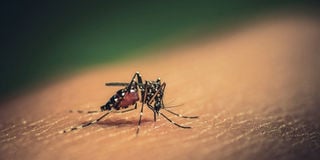In the race to stop dengue fever, scientists find a way out

A three-year trial on dengue-fever spreading mosquitoes (Aedes aegypti mosquito) has shown a reduction in cases.
What you need to know:
- Mombasa is a dengue endemic region with the last outbreak reported in April this year
- Data from WHO shows the number of dengue fever cases have increased eight fold over the two decades
There seems to be light at the end of the tunnel in the treatment of dengue fever after a successful clinical trial.
A three-year trial on dengue-fever spreading mosquitoes (Aedes aegypti mosquito) has shown a reduction in cases.
The study, conducted by the World Mosquito Programme, shows a 77 per cent reduction in dengue fever cases.
The study also shows an 86 per cent reduction of hospitalisation due to dengue fever.
Mombasa is a dengue endemic region with the last outbreak reported in April this year after 26 samples were found positive by public health officials conducting a surveillance.
The new study, which involved about 8, 000 people, was conducted in Yogyakarta city in Indonesia, which, like Mombasa, is an island.
The researchers found that only 2.3 per cent of the population that had the bacteria infected mosquitoes within them were infected with the dengue virus. Another 9.4 per cent of the population that had the non-infected mosquitoes was infected.
Severe headache
To achieve this milestone, the scientists infected the mosquitoes with a bacteria called Wolbachia. It has infectious agents that block the mosquitoes from reproducing the same type of mosquito but one that has Wolbachia bacteria in it. This hinders the dengue virus from reproducing and so the mosquitoes cannot infect people with the virus.
“This suggests the possibility of a portfolio of Wolbachia strains, each with different strengths and weaknesses, for application as public health interventions in areas in which dengue is endemic,” said the researchers in the study published in the New England Journal of Medicine.
Africa Centres for Disease Control and Prevention (Africa CDC) points out that one might have dengue fever if their body temperature is as high as 40 degrees Celsius and the main symptoms are severe headache, pain behind the eyes, muscle and joint pains, nausea, vomiting, swollen glands or rash. These symptoms last for about two to seven days.
The World Health Organization last year reported that half of the world’s population is at risk of getting infected with the virus.
Data from WHO shows the number of dengue fever cases have increased eight fold over the two decades. The estimated infections globally range from 100 to 400 million.
“This alarming increase in case numbers is partly explained by a change in national practices to record and report dengue to the ministries of health, and to the WHO. But, it also represents government recognition of the burden, and therefore the pertinence to report dengue disease burden,” says a WHO update in May.
Unfortunately, there is no treatment specific to dengue fever. Early intervention once someone has been found positive of the virus can help in reducing deaths to about one per cent.



